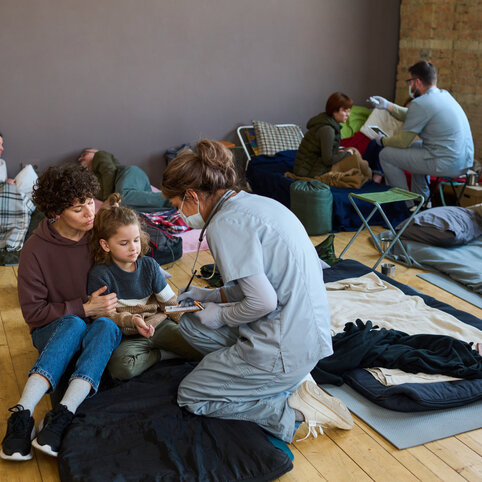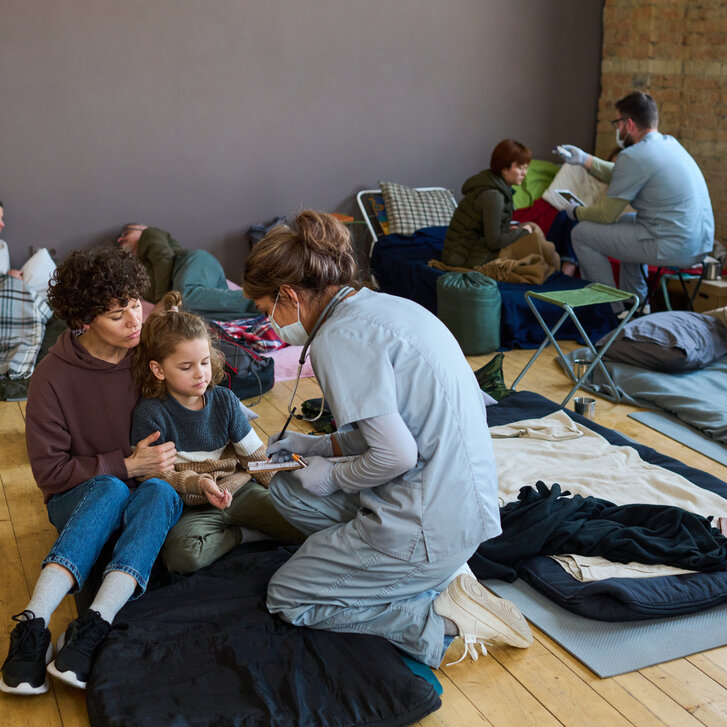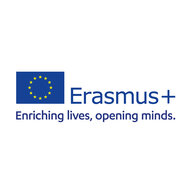
Erasmus+ Blended Intensive Programme
Disaster Medical Care in the Era of Global Conflict

Application
The program has reached its maximum capacity and is no longer accepting applications.
COURSE DESCRIPTION
This Erasmus Blended Intensive Programme offers a dynamic, interdisciplinary exploration of disaster and conflict medicine in the context of contemporary warfare and complex emergencies. Designed for healthcare students and professionals, the course blends online learning with an immersive in-person module in Salzburg, Austria.
Participants will examine the intersection of trauma care, humanitarian response, operational medicine, and healthcare diplomacy, with a focus on delivering medical care in conflict zones, fragile health systems, and large-scale emergencies. The curriculum emphasizes tactical emergency medicine, civil–military coordination, crisis leadership, CBRN response, ethical and legal frameworks, and the role of technology and implementation science in humanitarian and combat settings.
With contributions from global experts and institutions, the programme fosters collaboration and prepares the next generation of health professionals for the realities of medical response in today’s most volatile environments.
Core Topics
The five-day in-person programme at PMU will include:
- Foundations of military medicine, civil–military collaboration, and international humanitarian law.
- Contemporary threats and modern battlefield injuries, including blast trauma, ballistic wounds, burns, and CBRN hazards.
- Surgical and critical care in combat environments, including damage control surgery, resuscitation, and austere surgical techniques.
- Prehospital and tactical medical support, prolonged field care, evacuation protocols, and mass casualty management in combat zones.
- Military psychiatry, moral injury, rehabilitation of war-wounded, and veteran care systems.
- Global health impacts of conflict, epidemiology, refugee and displaced persons’ health, and protection from gender-based violence.
- Medical intelligence, counterterrorism medicine, and protection of health systems under cyber and information warfare threats.
- Scenario-based simulations integrating civilian and military medical response.
PREREQUISITE FOR PARTICIPATION
No prior experience in military medicine is required. The course is intended for students and staff in life sciences (medicine, nursing, pharmacy), public health, humanitarian assistance, security studies, or related fields. PhD candidates, faculty members, postdoctoral fellows, licensed medical doctors, and healthcare practioners interested in expanding their knowledge of conflict medicine and operational healthcare delivery are also welcome to participate.
Students must have completed a minimum of three years of study. Medical students must hold a valid internship license.
All students and staff must be formally nominated by their respective universities.
All participants are required to have a valid accident and liability insurance during the program.
COURSE DETAILS
- Language: English
- ECTS Points: 3
- In-person module: Monday, November 24, 2025 – Friday, November 28, 2025,
- Location: Paracelsus Medical University, Strubergasse 21, 5020 Salzburg, Austria
- Virtual session 1: November 19, 2025, 5:00–6:30 p.m.
- Virtual session 2: December 3, 2025, 5:00–6:30 p.m.
Certification: All participants will receive a certificate of completion. In addition, students will receive a Transcript of Records. Professionals who wish to apply for Continuing Medical Education (CME) credits must indicate their request in the registration form.
COSTS
Participants are responsible for their flights, accommodation, insurances, and other costs related to their travels. The PMU will cover the costs of lunches, snacks, opening dinner, social dinner, social activities, and course materials.
Salzburg is a highly attractive city and can be reached easily by plane, train, and car.
Programme Director
Dean, PMU School of Medicine
Managing Senior Physician, University Clinic for Orthopedics and Traumatology
Programme Lead
Vice President, Disaster Health Institute, 501(c)(3); General Secretary, EU Chapter of the World Association for Disaster and Emergency Medicine (WADEM), Chairman of European Disaster Alliance
Lecturers
Vice President, Disaster Health Institute, 501(c)(3); General Secretary, EU Chapter of the World Association for Disaster and Emergency Medicine (WADEM), Chairman of European Disaster Alliance
President of European Centre for Disaster Medicine (CEMEC), Specialized Centre of the Council of Europe’s Major Hazards Agreement
President of European Council for Disaster Medicine, Physician Belgian Defense, Universite Libre de Brussels
Conflict, War and Global Health Security Expert; First Faculty of Medicine, Charles University, Prague
Dean, PMU School of Medicine
Managing Senior Physician, University Clinic for Orthopedics and Traumatology
Retired Head of Nato Medical Branch; Special Consultant to the UN
Former Chairman of PMU Medical Student Representation; Board member of Medical Student Association, Graz; Explosives Officer, Tactical and Conflict Medicine Exercise Coordinator.
Erasmus + eligibility
Students and staff from partner universities can apply for Erasmus+ funding at their home institutions for a blended short-term mobility. For information about the grant application, applicants should contact their respective home university.
Please note that laboratory as well as outdoor activities will be carried out as part of the program. By submitting the online application form, you confirm that, if you are accepted to the course, you will have sufficient accident and liability insurance during the entire program.
Medical doctors in Austria can obtain 42 DFP points upon successful completion of the course. If you are applying for DFP points, please let us know in writing at least three weeks before the programme starts.
Accommodations in Salzburg
The following hotels are near our campus:
- IMLAUER Hotel: https://imlauer.com/ (15 min. walk)
- das Salz: https://dassalz.com/ (6 min. walk)
- Motel One: https://www.motel-one.com/de/hotels/salzburg/hotel-salzburg-mirabell/ (5 min. walk)
- Riverside Hotel: https://mynext.at/de/riverside-hotel-salzburg/ (4 min. walk)
- Hotel Lehenerhof: https://www.booking.com/hotel/at/lehenerhof.de.html (8 min. walk)
Motel One offers a special rate for PMU guests. For details, please inquire at Motel One directly.
Hostel options:
- Yoho International Youth Hostel Salzburg: https://www.hostelworld.com/st/hostels/p/735/yoho-international-youth-hostel-salzburg/ (20 min. walk)
- MEININGER Salzburg City Center: https://www.hostelworld.com/st/hostels/p/47668/meininger-salzburg-city-center/ (20 min by bus)
- a&o Salzburg Hauptbahnhof: https://www.hostelworld.com/st/hostels/p/265957/a-and-o-salzburg-hauptbahnhof/ (20 min. walk)
- myNext - Riverside Hotel Salzburg: https://www.hostelworld.com/st/hostels/p/88157/mynext-riverside-hotel-salzburg/ (5 min. walk)
- Guesthouse Salzburger Studentenwerk: https://guesthouse.at/en/ (20 min. walk)
Please note that the PMU is not affiliated with the accommodation providers listed above, and is therefore not liable for them.



